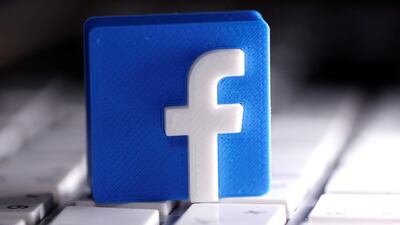Facebook shares fell on Monday, extending a recent sell-off related to a growing boycott by high-profile advertisers, but the trend doesn’t represent a major long-term risk to the social-media company’s stock, analysts said.
A number of companies, including blue-chip companies Starbucks, Unilever and Coca-Cola, have said they would cut or cease spending on Facebook, while General Motors is reviewing how its brands are marketed on the social-media platform. The moves are aimed at pushing Facebook, which also owns Instagram and WhatsApp, to limit hate speech or posts with disinformation.
Despite the lost revenue, “we do not expect significant risk to numbers” wrote Doug Anmuth, an analyst at JPMorgan. Referring to direct-response advertisement campaigns, he wrote that he expects marketers, “especially those DR [discount rate]-driven, will take advantage of potentially lower-priced inventory".
The firm reiterated its overweight rating and $245 (Dh900) price target on the stock. Facebook “has endured advertiser crises before”, and even after controversies like the one surrounding Cambridge Analytica, “marketers returned to the platform”.
__________
The Facebook advertisement boycotters
__________
Building on Friday’s 8.3 per cent share price slump, the stock fell as much as 4.2 per cent on Monday, though it later pared its decline to 0.8 per cent. Facebook remains up more than 40 per cent from a March low, but has declined about 12 per cent from a record close hit last week. The sell-off has erased more than $80 billion from Facebook’s market capitalisation.
The lost market value likely exceeds the financial impact of the boycotts by a substantial degree. Earlier on Monday, Bloomberg Intelligence estimated the boycotts “could cost Facebook over $250 million” in sales.
To compare, Wall Street expects Facebook will report full-year revenue of $77.1bn, and second-quarter sales of $17.1bn, a projection that has risen by 0.2 per cent over the past week. The consensus for third-quarter revenue has also risen a similar amount in the last week.
JPMorgan was not the only firm to downplay the risk of the boycott on the stock. MKM Partners said Facebook has millions of paying advertisers around the world, and that it is not dependent on any single one for a significant amount of revenue. The firm recommended buying the stock “amid current incremental weakness”, as did Raymond James, which wrote that boycotts “are not new” and that the financial impact “will be minimal”.
Raymond James analyst Aaron Kessler expects the duration of paused spending will “be short-lived”, and he expressed optimism that recently-announced changes by Facebook on issues related to hate speech “will help alleviate advertiser concerns”.
Among other social-media stocks, Twitter rose 0.6 per cent on Monday while Snap was down 2.3 per cent. Pinterest shares dropped 2.2 per cent.
JPMorgan wrote that such platforms “will see collateral damage” from the boycotts, and singled out Twitter as being the “most at risk given its high degree of brand spend and function as an open town hall with more politicised nature". Snap will be more insulated as its platform “cleanly separates personal chat from professional content and news, the latter of which is curated", it wrote.
MKM’s Rohit Kulkarni speculated the Snapchat parent “could benefit from near-term uncertainty with advertiser policies related to YouTube and Instagram”. Sentiment surrounding Snap has been improving of late, with analysts pointing to the monetisation potential of recently-announced products and features.



























